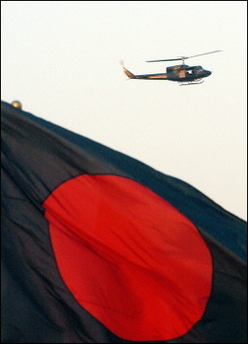|
South Asian summit to open amid tight security
(AFP)
Updated: 2005-11-12 11:28
A summit of south Asian nations is to open in Bangladesh amid unprecedented
security after a series of bomb attacks linked to a group calling for the
imposition of Islamic law in the country.
More than 30,000 troops have been deployed specifically for the summit in the
capital Dhaka where police have been on high alert since the blasts in August
and October that killed five people.
Small bombs were detonated almost simultaneously across the country that also
injured several hundred people. Police linked the outlawed Jamayetul Mujahideen
to the attacks with leaflets calling for the imposition of strict Islamic law
found at many of the blast sites.
The 13th summit of the South Asian Association for Regional Cooperation
(SAARC) on Saturday and Sunday will be attended by leaders of member countries
Bangladesh, Bhutan, India, the Maldives, Nepal, Pakistan and Sri Lanka.
"Never before in our history has the country seen such a security
arrangement," said Bangladesh national police chief Abdul Kaiyum.

A Bangladeshi Rapid Action Batallion (RAB)
helicopter hovers over the country's flag as leaders arrive for the 13th
South Asian Association for Regional Cooperations (SAARC) summit at Zia
International Airport, Dhaka.[AFP] | Bangladesh's elite President's Guard Regiment took over security at the
capital's airport earlier in the week while troops have been posted on key
streets and road blocks erected along routes to the summit venues.
"It's almost like (a) curfew because we don't want to leave anything to
chance," said one police officer.
Last week police rounded up Dhaka's beggars and vagrants who were being
detained in another part of the city during the summit. Police said they feared
terrorists would try to use vagrants to disrupt the talks.
During the summit, leaders are expected to agree to set up a regional
disaster preparedness centre in New Delhi and the implementation of a previously
agreed South Asian Free Trade Agreement. Strategies for combating terrorism are
also expected to top the agenda.
SAARC was founded amid much optimism in 1985 to forge economic solidarity and
boost living standards among the region's 1.4 billion people.
South Asia is home to half the world's poor with 40 percent living on less
than a dollar a day, according to the World Bank.
Critics, however, have dismissed it as a talking shop rendered ineffective by
regional bickering and mistrust.
Bangladesh Prime Minister Khaleda Zia has said she hoped the Dhaka summit
would mark a new chapter in SAARC's history and see it begin to deliver results
for the people of South Asia.
"For Bangladesh, it (the 13th summit) marks the commencement of a third cycle
of summits in which the focus will be on implementation rather than
declarations," she said in a statement released on Friday.
"We the South Asian nations must take advantage of our natural and human
resources, strong cultural and historical linkage and our common desire to move
forward in improving the quality of life of our peoples," she said.
The summit was originally planned from January 9-11 but was cancelled because
of the Asian tsunami disaster.
Rescheduled for February, it was postponed again at the last minute after
India decided not to attend.
|